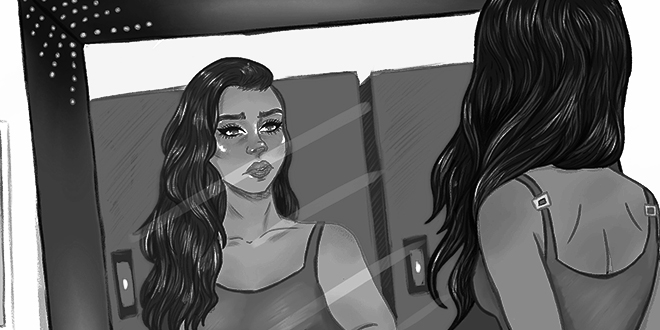Nursed to Health, a recurring feature in The Florida Times-Union, has a new name—Healthy Life. Jacksonville University Brooks Rehabilitation College of Healthcare Sciences faculty discuss symptoms, diagnoses, and treatments based on patient cases handled by instructors, students, and alumni.
By Katie Stuart, MS, LMHC, CIC
What comes to mind when you think about your body? According to the National Eating Disorder Association, 30 million individuals in the U.S. will suffer from a diagnosable eating disorder at some point in their lives.
These statistics do not include the millions of Americans that are currently struggling with negative views of themselves, disordered eating, over-exercise, isolation, and other unhealthy behaviors. Body image is not just what we see when we look in the mirror, but also how we think and feel about what we see. This self-perception impacts our physical health as well as our mental, emotional, social, and relational health.
Angela
Angela struggled with weight and body dissatisfaction for much of her life. As a 35-year-old mother of two, she decided to seek counseling out of concern that her own body image issues were influencing her children’s body beliefs. During the initial assessment, Angela also reported struggles with isolation, depressed mood, anxious thoughts, and relational issues with her partner due to negative feelings about herself.
Over the course of the next few counseling sessions, the counselor educated Angela on the concepts of” intuitive eating” and “health at every size.” Angela began focusing on bringing more awareness to how she viewed herself and questioned the origin and truth of these thoughts. She practiced being more attuned and responsive to her body’s signals and focusing on new self-care habits. After adopting alternative ways of viewing herself and her health, Angela was able to gain more comfort and confidence about her body, speak kinder about herself and others, and model whole body health and body kindness for her children.
In turn, she noticed improvements in mood, productivity, and relationship satisfaction. Angela still has days where the old negative thoughts try to dominate her mental and physical health, but she is now able to recognize these thoughts and beliefs, acknowledge them, and return her focus to an attitude of body kindness and respect.
How to work toward developing a healthier body image for yourself and others:
- Become aware of the comments you tell yourself when you look in the mirror or catch a glimpse of that “unflattering” angle of yourself in the photo. Would you talk to your child or your best friend the way you talk to yourself?
- Ditch the scale. One small machine cannot measure your health, your athleticism, your humor, your kindness, your worth.
- Trust your body’s signals. Our bodies are brilliant machines that will tell us when and what we need (e.g. more nutritious foods, more movement, more rest, more water, etc.)
- Question and challenge the sociocultural messages about unrealistic body ideals that you have been given. Where did you learn these ideas/beliefs, and is there any truth to them?
- Keep a list of the traits that you like about yourself, especially those that are not related to body, weight, appearance, etc. Are you kind, intelligent, funny, artistic, loyal?
- Look at yourself as a whole person, not just a body. Health does not fit any one size. Focus on making small healthy choices that make you feel good in the body you have now. It’s all you have in this moment.
- Find gratitude in what your body does for you every day – laughing, hugging, walking, dancing, listening, writing, cooking, breathing. It’s helped you make it this far – celebrate it!
- Adopt an attitude of curiosity, not judgment. How can we respect and listen to someone if we are simultaneously judging them?
- Make friends with your body – treat it like someone you care about. Practice intuitive eating by feeding it a variety of nutritious and “play” foods that satisfy you. Move your body because it feels good and you are proud of what it can do for you. Give it social interaction, but also give it rest.
“Self-perception impacts our physical health as well as our mental, emotional, social, and relational health.”
Resources for developing healthy body image:
Intuitive Eating by Evelyn Tribole, MS, RDN and Elyse Resch, MS, RDN
Health at Every Size by Linda Bacon, PhD
Body Kindness by Rebecca Scritchfield, RDN
Body Positive Power by Megan Jayne Crabbe
https://www.nationaleatingdisorders.org/
https://www.intuitiveeating.org/
Today’s column is by Katie Stuart, a Licensed Mental Health Counselor, Certified Intrinsic Coach, and Certified Intuitive Eating Counselor. She is also the Clinical Field Site Coordinator in the Jacksonville University Brooks Rehabilitation College of Healthcare Sciences Clinical Mental Health Counseling Program. Email your questions to kstuart5@ju.edu.
Names and specific medical information in Healthy Life have been changed to protect private health information. Readers with specific questions or health concerns should seek the advice of their healthcare provider.
 Wave Magazine Online Jacksonville University News Hub
Wave Magazine Online Jacksonville University News Hub
